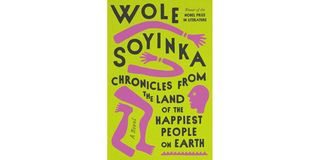Premium
Why Wole Soyinka’s new book is a dire warning for Kenya

Nigerian author and Nobel Laureate Wole Soyinka. He has released his first novel since 1973 titled ‘Chronicles from the Land of the Happiest People on Earth’.
What you need to know:
- Soyinka is known mostly for plays and poetry though he has earlier written two novels.
- The author hopes that the new book will cause deep reflection.
“If my heart beats for Kabul, it’s for the slopes of Bala Hissar, holding my dead in its foothills. Though not one, not one, of those wretched hearts, ever beat for me,” so writes Shakila Azizzada in her teary poem entitled, Kabul. It’s a poem of love, and being about love, about heartbreak. Shakila loves Kabul but the city doesn’t return the favour.
As it has been said, this is the story of all great loves: it is the beloved or nothing. When love is not reciprocal, one of the lovers suffers. This is exactly what happens in Chronicles from the Land of the Happiest People on Earth, the newest novel by Nobel Laureate Wole Soyinka, his only novel since 1973. He is known mostly for plays and poetry though he has earlier written two novels.
Soyinka must cut the image of the biblical prophets of old — aging, long-bearded and probably alone and embittered in his home town of Abeokuta in Southwest Nigeria as he reflected on his beloved Nigeria — he penned this satirical novel of a disfigured country. A country that doesn’t reciprocate his love. And like a poet of disappointed love, he twists the knife as he writes with the ferocity of a jilted lover. Bristling with boiling fury, he confronts the Nigerian experiment that has become synonymous with runaway corruption, mass kidnappings, Boko Haram killings, suicide bombings, amputations and ricocheting gun sounds.
The plot story is about a man with a sinister online business that sells body parts for use in rituals. That’s shocking and it’s the whole point because the things happening in much of Nigerian society are shocking. Soyinka has no neon illusions: Nigeria has degenerated into something unrecognizable and terrifying and this latest novel is his way of settling accounts.
However, Nigeria is not alone. It is a stirring call to arms against the abuse of power from one of our fiercest political activists, who also happens to be a global literary giant.
Kenya, like other young democracies, has grown, toddled, wobbled and sometimes fallen. The country has staggered, weakened by corruption, violence, unemployment, injustice, starvation and outright lies of politicians to others and to citizens.
There are many parallels between the Nigeria depicted in the novel and the challenges Kenya is grappling with as we gear up for the 2022 general elections.
“Nigeria is in a sad, sad space,” Soyinka laments in an interview about the book. He adds that, “This has been an internal demand for a number of years. And the more this society decays, the greater betrayal we encounter… This society needs to be told some truths and told in some harsh, rigorous way. And when I say society, I am not just saying government, I am talking about a society that has been programmed to accept” rape, corruption and murder.

Cover page of Wole Soyinka's new book ‘Chronicles from the Land of the Happiest People on Earth’.
This is true not only for Nigeria but also for Kenya. We blame everything on politicians but citizens can also be corrupt so the entire society needs to be reprogrammed.
Soyinka then addresses the elites who even as the masses wallow in misery and poverty, “There are those doing very well for themselves”.
He argues that there is something bubbling under the surface as the rich get richer as they continue exploiting the poor and the contradictions grow.
He says of Nigerians that, “we have a habit of swallowing bile in this nation, which is putting a brave face on things. The danger is that there comes a point when this veneer shatters completely and it manifests itself… in violence that strikes people as meaningless but actually there is a reason behind it – there is a buildup of numerous causative forces.”
This is particularly true of Kenyans. We make memes out of everything and drown everything in mirth and laughter even as we warn each other that “it will end in premium tears” when talking of imminent political betrayal complete with illustrations of a truck carrying tears. However, underlying all these memes sometimes are real issues that frustrate people, and this could manifest in violence and then we are all “shocked”.
Soyinka hopes that the new book will cause deep reflection. When asked about what inspired the title, Chronicles from the Land of the Happiest People on Earth, Soyinka says that, “How do ideas for a creative work come into being? Sometimes it’s just something somebody said… and it strikes you very forcibly”.
He says that he was inspired by a poll about a decade ago that claimed that Nigerians were the second happiest people on earth. And he asked himself where those happy people were. That planted the seed for the novel. He says that the title is “deliberate. It’s a negative title. It doesn’t talk about the happiest people and it has no intention to… it’s deliberate irony”. He explains that “the title is not supposed to be taken at face value” as there are mostly miserable people in the novel like they are in Nigeria or Kenya.
As we gear up for the forthcoming general elections in 2022, Chronicles from the Land of the Happiest People on Earth is a good read for all of us. More importantly, we should take the lessons therein to heart as we need to have truthful conversations about the difficult challenges we are facing as a nation and chart a united way forward.





